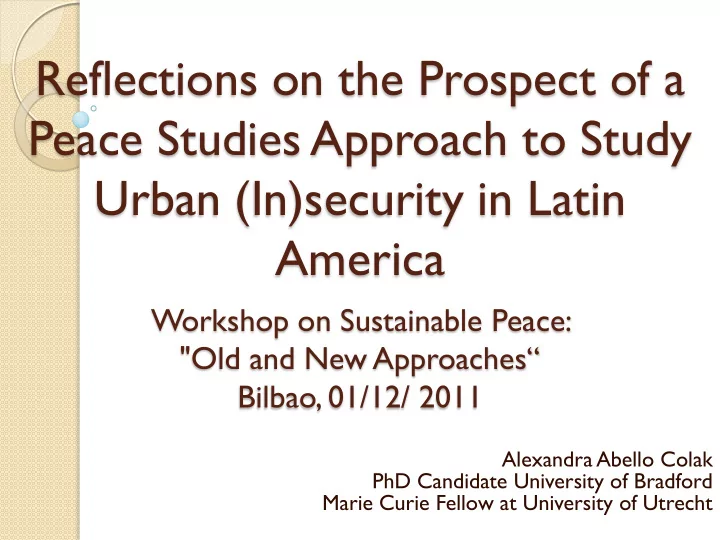

Reflections on the Prospect of a Peace Studies Approach to Study Urban (In)security in Latin America Workshop on Sustainable Peace: "Old and New Approaches“ Bilbao, 01/12/ 2011 Alexandra Abello Colak PhD Candidate University of Bradford Marie Curie Fellow at University of Utrecht
Urban Insecurity Armed violence growing at the fastest rate since 1999 31% of global homicides ocurred in the Americas in 2010 (144,000) Urban violence and criminality have become the first concern for Latin Americans (7 countries)
The perception of insecurity in the region is extremely high and victimization levels are on the rise. 73% of Latin-Americans fear that they could become victims of violent crime.
Young men between 15 and 29 are especially affected, either as victims or as perpetrators of violence and crime. The homicide rate for young men between 15 and 29 is 68.9 per 100.000 inhabitants For young population of higher income is 21.4 per 100.000 and for the same population group with medium and lower income, the rate is 89.7 per 100.000.
Complex phenomenon with multiple causes… Ten of the 15 most unequal countries in the world are in Latin America and the Caribbean region. According to the World Bank the richest one-tenth of the population in Latin America and the Caribbean earns 48% of total income, while the poorest tenth earns only 1.6%.
Responses
What is the connection between SECURITY and PEACE? SUSTAINABLE SECURITY PEACE Processes of multilevel Focused on Social order transformation and and control social change Eliminating threats (internal or external)
How can security become an enabler of sustainable peace?
The search for an approach … PEACE STUDIES? Multidisciplinary Critical Practice oriented Normative framework
The impact From quantitative to qualitative From institutional centred to a focus on people’s daily experiences (methods)
Getting a different picture Differential impact of violence and insecurity (women, children, young people. LGTB, etnic groups, etc)
Normalization of violence Complex relation between armed actors and communities Paradoxical sources of insecurity (security forces) AGENCY and resilience!
Developing a Participatory Methodology Understanding and transforming (in)security (Action-research) Coproducing knowledge Community Impacting on Developing Security Public Policy community Agenda initiatives
What is the role of knowledge production in building sustainable peace? How critical are we of the limitations of our own methodological choices? Is there space for dialogue among different approaches and disciplines within XXI century peace studies?
‘I feel like we have been sold all this time a concept of security that definitely does not work for us, we have to start constructing a new idea of security together, all of us, women and men, the youngsters from the popular neighbourhoods and the other ones, right? We still have to discuss what security really is... Andrea 25 resident of comuna 1
Recommend
More recommend